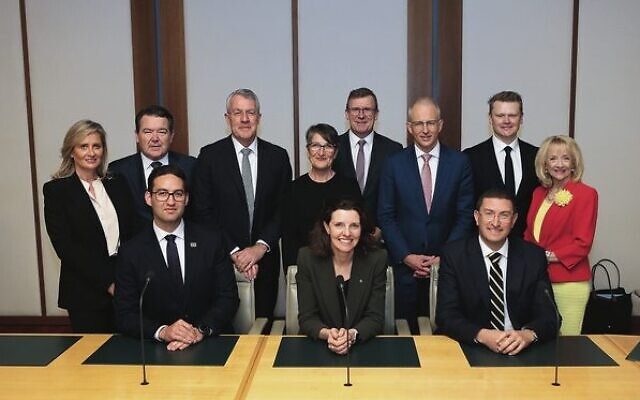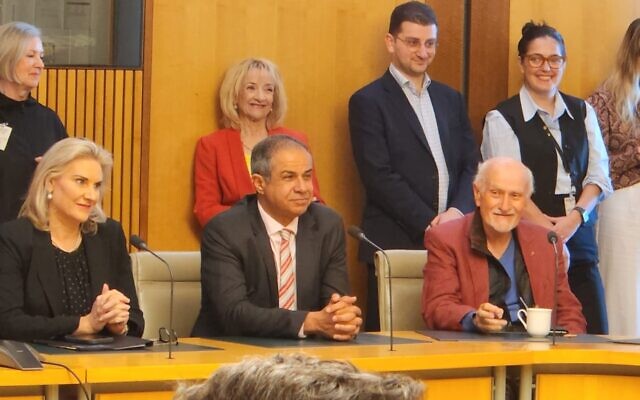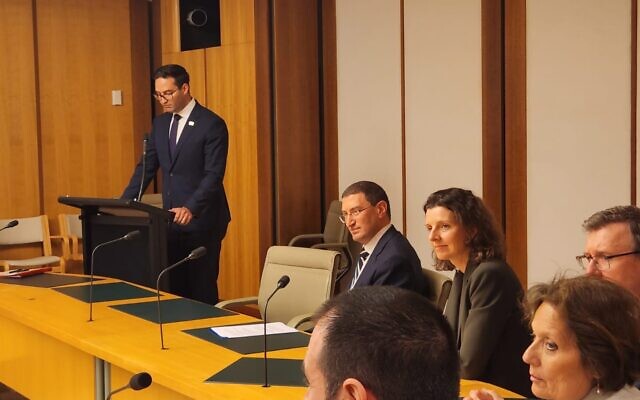Parliamentary Friends of IHRA officially launched in Canberra
The newly formed Parliamentary Friends of IHRA was officially launched last Thursday at Parliament House in Canberra with members of Parliament, foreign dignitaries and Jewish communal leaders present.

The first order of business of the federal Parliamentary Friends of the International Holocaust Remembrance Alliance (IHRA) will be writing to universities, urging them to adopt the IHRA working definition of antisemitism, founding co-chair Julian Leeser announced last week.
The newly formed group was officially launched last Thursday at Parliament House in Canberra with members of Parliament, foreign dignitaries and Jewish communal leaders present.
Outlining its importance, co-chair Josh Burns noted that “we are the last generation that will know Holocaust survivors” and “be able to witness firsthand the memories of what occurred”.
“It’s now up to us to carry on the legacy, to pass on the lessons and stories, the history and the truth about what happened,” the Labor member for Macnamara said.
Noting that “support for IHRA has always been above politics”, he paid tribute to former treasurer Josh Frydenberg for leading the push to establish Holocaust centres around Australia.
Burns also lauded the leadership of the Gandel Foundation, saying it “has been integral to Holocaust remembrance”. Earlier this year the foundation released a landmark study into attitudes and knowledge of the Holocaust in Australia.
Leeser, the Liberal member for Berowra, said one of the challenges in Australia is a lack of understanding of various antisemitic tropes.
He gave the example of having a campaign poster defaced with dollar signs prior to the 2019 election.

“My highly educated, Judeophilic campaign team, who were people of their own deep faith, had no idea what these symbols meant,” he said.
“To me it was a reminder of the importance of IHRA – that if educated people involved in politics who are not from our community don’t understand these symbols, we’ve got a lot of work to do.”
Praising the bipartisan support for the IHRA definition, he said, “Our next item is to write a joint letter to all the universities in Australia to get people to adopt the IHRA definition, because universities in some respects are the frontline of the battle against antisemitism.”
“It’s now up to us to carry on the legacy, to pass on the lessons and stories, the history and the truth about what happened…” Josh Burns
Independent member for Wentworth Allegra Spender said it was through partnerships such as IHRA – “across communities, across nations” – that a difference can be made.
“Australia is the most successful multicultural country in the world,” she noted.
“But antisemitism is a blight on that, it’s a blight on the community, but it’s actually a blight on that broader goal to be the most welcoming country in the world.”
She recalled visiting Auschwitz and being confronted with the physical elements of the place, as well as attending the “incredibly moving” annual reading of the names at Sydney’s Rookwood Cemetery.
“When you actually personalise what has happened to people … that’s when you really convert people to be flag-bearers for the fight against antisemitism,” she said, pointing to the importance of Holocaust museums.
“That is the way that we can share the message and the learnings of the Holocaust … it is those stories that I think help us change our minds.”
Once a letter has been sent to universities, she said, the next priority would be engaging with state education departments to ensure that mandatory Holocaust education, currently legislated in NSW and Victoria, is adopted across Australia.

Gandel Foundation director Lisa Thurin told those present, “The ugly face of antisemitism and racism continues to grow.
“It’s no longer confined to the fringes of society, but it is becoming mainstreamed and even normalised,” she said.
But she said Holocaust education is one of the main ways to combat intolerance, noting the Gandel survey showed higher levels of Holocaust awareness “were associated with kinder sentiments towards Jewish people and other communities”.
Thurin also called for the establishment of a government-funded, independent body similar to the UK’s National Holocaust Memorial Trust, mandatory Holocaust education in all Australian schools, and more federal support and funding for Holocaust museums and the Australian Holocaust Museum Alliance.
Melbourne Holocaust Museum co-president Pauline Rockman, a member of the Australian delegation to IHRA, said IHRA’s 35 member countries, 10 observer countries and eight permanent inter-governmental partners “recognise that international political coordination is imperative to strengthen the moral commitment of societies and to combat Holocaust denial and antisemitism, which is sadly increasing”.
She read a message from the current head of the Australian delegation Bernard Philip – the Australian ambassador to Sweden, Finland and Latvia – who said, “Australia has become a highly respected member of IHRA during a relatively short period of full membership”.
“In particular, our experts are influential in shaping IHRA’s work across a broad spectrum, including in areas such as education, and countering online extremism,” Philip’s message said.
Concluding, Rockman noted that her mentor, the late Holocaust survivor Kitia Altman, had said, “‘The Holocaust is an event that happened to the Jewish people, but it belongs to the whole world.’
“Dear Kitia,” Rockman said, “This is the legacy you have entrusted us with and in truth, it’s our legacy and it belongs to us all.”

comments